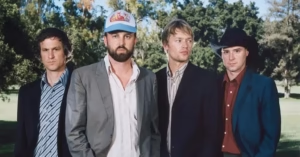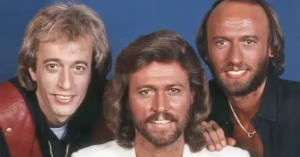Sting: From Punk-Reggae Frontman to Sophisticated Solo Virtuoso
Sting. Early Life and Origins
Sting, born Gordon Matthew Thomas Sumner on October 2, 1951, in Wallsend, England, earned his nickname from wearing a black and yellow striped sweater during jazz gigs — likened to a bee.
Originally a schoolteacher, Sting played in several bands before co-founding in 1977 with Stewart Copeland and Andy Summers.
Sting. Fame with The Police (1977–1984)
As the bassist, lead vocalist, and main songwriter of The Police, Sting led the band through a meteoric rise with hits such as:
- “Roxanne”
- “Every Breath You Take”
- “Don’t Stand So Close to Me”
- “Message in a Bottle”
Sting’s intellectual lyrics, reggae-influenced rhythms, and high-tenor voice helped The Police become one of the world’s biggest bands in the early 1980s.
After Synchronicity (1983), the band disbanded, and Sting launched his solo career.
Sting. Solo Career: Reinvention and Musical Exploration
✦ The Dream of the Blue Turtles (1985)
His debut solo album showcased jazz influences and featured members of Weather Report.
Tracks:
- “If You Love Somebody Set Them Free”
- “Fortress Around Your Heart”
- “Russians” – A Cold War ballad with classical motifs
✦ …Nothing Like the Sun (1987)
A personal and artistic high point, with:
- “Fragile” – A delicate protest ballad
- “Englishman in New York” – An ode to eccentricity
- “Be Still My Beating Heart”
✦ The Soul Cages (1991)
An introspective record influenced by the death of Sting’s father.
- “Why Should I Cry for You?”
- “All This Time”
- The title track, rich in symbolism and nautical metaphors
✦ Ten Summoner’s Tales (1993)
A commercial and critical smash featuring:
- “Fields of Gold” – A timeless love ballad
- “If I Ever Lose My Faith in You” – Grammy-winning track
Sting. Later Works and Experiments
Sting’s solo work is characterized by genre fusion, including classical, world, and folk.
Sting. Notable albums:
- Mercury Falling (1996) – Gospel and folk undertones
- Brand New Day (1999) – Won two Grammys; includes “Desert Rose” (with Cheb Mami)
- Songs from the Labyrinth (2006) – An album of John Dowland’s Renaissance lute music
- The Last Ship (2013) – Based on a musical about shipbuilding and community
- 57th & 9th (2016) – Return to rock-oriented material
- My Songs (2019) – Reimagined versions of classic hits
- The Bridge (2021) – His 15th studio album, reflecting on mortality and time
V. Legacy and Influence
Sting is known for:
- Artistic bravery, seamlessly crossing genres
- Writing intelligent, poetic lyrics
- Being a multi-instrumentalist, composer, and actor
- Environmental and human rights activism
Accolades:
- 17 Grammy Awards
- Rock and Roll Hall of Fame inductee (2003) with The Police
- Kennedy Center Honors recipient (2014)
- Over 100 million albums sold (solo + Police)
Influenced artists:
- Seal, Ben Harper, Dave Matthews Band
- John Mayer, Norah Jones, and many jazz-pop crossovers
Personal Life and Activism
Sting is married to actress and producer Trudie Styler, with whom he has four children. He’s an advocate for:
- Rainforest preservation (co-founded the Rainforest Foundation)
- Amnesty International and other human rights causes
- Support of indigenous communities and LGBTQ+ rights
He is also a Tantric yoga practitioner, which became a source of media fascination in the early 2000s.
Interesting Facts
- Sting appeared in films such as Dune (1984), Quadrophenia, and Lock, Stock and Two Smoking Barrels
- He has written a Broadway musical (The Last Ship) based on his youth in Newcastle
- He is one of few artists equally respected in rock, jazz, and classical circles
- His name “Sting” is so iconic that he legally uses it as his passport name





